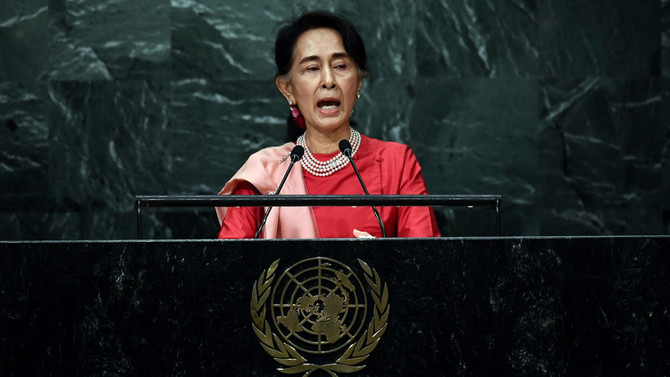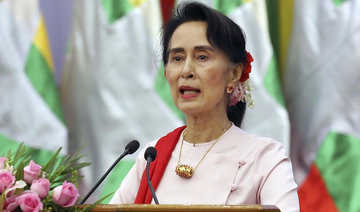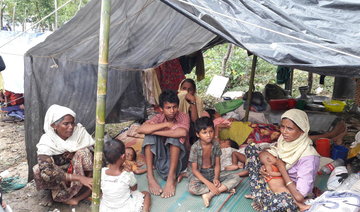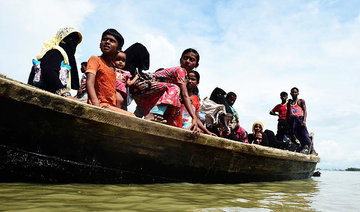BANGKOK: As Rakhine state burns and Rohingya flee, Aung San Suu Kyi is preparing to address Myanmar on the crisis for the first time — a high wire act seeking to soothe global outrage without baiting an army that is again showing its teeth.
Suu Kyi took office last year as Myanmar’s first civilian leader after 50 years of junta rule.
She has since focused her energy on the delicate political dance between her civilian government and the generals who still hold many of the levers of power.
On Tuesday the Nobel laureate will give the biggest speech of her time in office.
The nationally-televised turn will break a near silence since the ulcerous ethnic and religious hatreds in western Rakhine state erupted into killings on August 25, sending 400,000 Muslim minority Rohingya fleeing into Bangladesh.
Some 30,000 ethnic Rakhine Buddhists and Hindus have also been internally displaced.
In an interview with the BBC, UN Secretary General Antonio Guterres said the stakes were high for Tuesday’s speech, calling it a “last chance” to stop the unfolding humanitarian calamity.
“If she does not reverse the situation now, then I think the tragedy will be absolutely horrible, and unfortunately then I don’t see how this can be reversed in the future,” he said.
The latest violence was sparked by Rohingya militants’ raids on 30 police posts in Rakhine state.
The UN calls the army fightback a “textbook example of ethnic cleansing” with villages set ablaze to drive Rohingya civilians out.
Many abroad are puzzled as to how rights can be flagrantly denied to a specific group by a people who once nobly demanded their own in the face of a junta.
Suu Kyi’s televised address — likely at least in part to be in English — comes ahead of a meeting at the UN General Assembly in which Myanmar is expected to be hammered over the crisis.
But analysts say her power to stay the military is limited, and her response thus far indicates she is choosing the lesser of two evils.
“She’s signalling that her chief priority is the relationship between the government and military and that the pogrom is secondary to that,” Francis Wade, author of ‘Myanmar’s Enemy Within: Buddhist Violence and the Making of the Muslim ‘Other” told AFP.
“This obviously raises questions about the quality of leadership she seeks to bring, but also that the political game in Myanmar is worth the sacrifice of entire communities.”
Suu Kyi’s National League for Democracy (NLD) swept the board when the military permitted elections in 2015.
Before they loosened their chokehold on power, the generals wrote themselves into the constitution, embedding their political future with a bloc of legislative seats and total control over security.
Over the last two years, Suu Kyi’s gradualism, and her refusal to upset the organization that kept her under house arrest for almost two decades, has seen the sprouting of the first green shoots of the rule of law in Myanmar.
But the eruption of violence in Rakhine and the pressure from the outside world for her to “do something about it” risks upsetting that balance.
All the more so in a country where the majority of the population shares the military’s view that Rohingya Muslims — whom it disparagingly calls “Bengalis” — are interlopers bent on taking land and resources from Buddhists.
A leader who bends too far to international will could lose the support of the people she governs.
In these circumstances, observers say, it is not hard to imagine another coup by an army that always used national security concerns to justify its iron-fisted rule.
From the ashes of Rakhine, commander-and-chief Min Aung Hlaing is emerging as an unexpectedly popular figure, defying deep mistrust of the military.
Through Facebook and Twitter he has successfully pitched his once reviled institution as the defender of Myanmar’s territorial sovereignty and the Buddhist faith against “extremist Bengali terrorists.”
On Saturday his Facebook feed repeated the widely-held domestic view that the Rohingya have “never been an ethnic group in Myanmar.”
With the army flexing its muscles, Suu Kyi’s next steps have become increasingly treacherous.
A complex swirl of ethnic and religious rivalries, incubated under five decades of military rule, has toxified all debate inside Myanmar around the Rohingya.
The militant attacks of August 25 are seen by many Buddhists as confirmation of long-held fears that overseas-based Islamists are intent on taking over Rakhine state — the western gateway to wider Myanmar.
Fear has overridden empathy for the Rohingya, who still trudge in wretched, hungry lines to Bangladesh.
So far, and despite the global finger-pointing, Suu Kyi remains a galvanizing force in Myanmar.
Her reticence to publically defend the Rohingya has been applauded across the political divide — even by notorious Buddhist nationalist monks.
“She is not your leader. She is OUR leader,” Mayzin Aye, a businesswoman renowned for supporting Suu Kyi, wrote on Facebook — where much of Myanmar’s discourse takes place.
“She is not an icon for us. She is not a Saint for us. She is our country’s leader... She gives up everything for our freedom from military rulers.”
High stakes in Myanmar as Suu Kyi to address Rohingya crisis
High stakes in Myanmar as Suu Kyi to address Rohingya crisis

Ukraine’s Zelensky says Russian artillery fire has not subsided

KYIV: Ukrainian President Volodymyr Zelensky said on Saturday that, according to his top commander, Russian artillery fire had not subsided despite the Kremlin’s proclamation of an Easter ceasefire.
“As of now, according to the Commander-in-Chief reports, Russian assault operations continue on several frontline sectors, and Russian artillery fire has not subsided,” Zelensky wrote on the social media platform X.
“Therefore, there is no trust in words coming from Moscow.”
He recalled that Russia had last month rejected a US-proposed full 30-day ceasefire and said that if Moscow agreed to “truly engage in a format of full and unconditional silence, Ukraine will act accordingly — mirroring Russia’s actions.”
“If a complete ceasefire truly takes hold, Ukraine proposes extending it beyond the Easter day of April 20,” Zelensky wrote.
Kyiv calls on foreign troops not to take part in Russia’s May 9 parade

- “The Russian army has committed and continues to commit atrocities in Ukraine,” Kyiv’s foreign ministry said
- “These people are not liberators of Europe, they are occupiers and war criminals“
KYIV: Ukraine warned Tuesday against any foreign troop participation in Russia’s May 9 parade to mark 80 years since the defeat of Nazi Germany, saying it would be “unacceptable” and seen as helping Moscow “whitewash its war crimes.”
A handful of countries have in recent years sent their militaries to take part in Russia’s traditional May 9 parade — a showpiece event that has become the country’s most important public holiday under President Vladimir Putin’s quarter-century in power.
“The Russian army has committed and continues to commit atrocities in Ukraine on a scale that Europe has not seen since World War II,” Kyiv’s foreign ministry said.
“It is this army that will march on Red Square in Moscow on May 9. These people are not liberators of Europe, they are occupiers and war criminals.”
Kyiv said marching with Russian soldiers would be considered as “sharing responsibility” for Moscow’s actions during its three-year Ukraine invasion.
“To march side by side with them is to share responsibility for the blood of murdered Ukrainian children, civilians and military, not to honor the victory over Nazism.”
Ukraine was one of the most devastated countries during World War II, with Kyiv saying it “touched every Ukrainian family.”
The foreign ministry also said that six million Ukrainians fought in the Red Army — with five million Ukrainian civilians killed and three million Ukrainian troops.
Russian leader Vladimir Putin attributed the victory over Nazism in Europe as a feat primarily achieved by the Russian nation.
Central Asian troops have often taken part in the Moscow parade.
The Kremlin has this year not ruled out that North Korean soldiers could take part for the first time, after Pyongyang’s troops helped Moscow oust Ukrainian soldiers from Russia’s Kursk region.
UN chief: India, Pakistan must ‘step back from the brink’

- Countries should exercise ‘maximum restraint’ amid soaring tensions, says Antonio Guterres
- UN Security Council holds closed-door session to discuss dispute
NEW YORK CITY: UN Secretary-General Antonio Guterres has called on India and Pakistan to exercise “maximum restraint” amid soaring tensions between the two countries.
It follows last month’s terror attack in the Pahalgam area of Jammu and Kashmir.
Both countries administer parts of the territory but claim it in full.
The attack on April 22 killed at least 26 civilians and injured many more.
Guterres, speaking outside the Security Council at UN Headquarters in New York City on Monday, warned that tensions between India and Pakistan “are at their highest in years.”
He added: “I deeply respect and am profoundly grateful to the government and people of both countries — and their significant contributions to the work of the UN, not least UN peacekeeping.
“And so it pains me to see relations reaching a boiling point.”
The Indian government today will carry out a nationwide civil defense drill to simulate an attack on its territory.
Pakistan on Saturday test-fired a ballistic missile with a range of 450 km.
Guterres called on the two countries to “step back from the brink,” and warned that a “military solution is no solution.”
He said: “I understand the raw feelings following the awful terror attack in Pahalgam on April 22.
“I once again strongly condemn that attack and extend my condolences to the families of the victims.
“Targeting civilians is unacceptable — and those responsible must be brought to justice through credible and lawful means.
“It is also essential — especially at this critical hour — to avoid a military confrontation that could easily spin out of control.
“Now is the time for maximum restraint and stepping back from the brink.
The UN Security Council met on Monday in a closed-door session to discuss the tensions.
Guterres pledged to support “any initiative that promotes de-escalation, diplomacy and a renewed commitment to peace.”
Macron to host Syrian leader’s first European visit

- French President Emmanuel Macron will welcome Syrian leader Ahmed Al-Sharaa to Paris on Wednesday for his first visit to Europe
PARIS: French President Emmanuel Macron will welcome Syrian leader Ahmed Al-Sharaa to Paris on Wednesday for his first visit to Europe, despite growing doubts about Syria’s ruling Islamist coalition and protests from France’s far right.
Since the fall of longtime Syrian ruler Bashar Assad in December following fourteen years of devastating war, the international community has been pressing the new authorities, who have roots in the Al-Qaeda jihadist network, to respect personal freedoms, protect minorities and include all components of society in the country’s transition.
Many countries say they will monitor the new authorities’ conduct before fully lifting Assad-era sanctions.
“This meeting is part of France’s historic commitment to the Syrian people who aspire to peace and democracy,” the Elysee Palace said on Tuesday.
Macron will “reiterate France’s support for the construction of a new Syria, a free, stable, sovereign Syria that respects all components of Syrian society,” the presidency said.
Macron will also emphasize “his demands on the Syrian government, primarily the stabilization of the region, including Lebanon, and the fight against terrorism,” it said.
President Sharaa is still subject to a UN travel ban. France most likely had to request an exemption from the United Nations, as was the case for his recent trips to Turkiye and Saudi Arabia, according to a source familiar with the matter.
France, a former colonial ruler of Syria, is eyeing an opportunity to increase its influence in the country after years of Russian presence.
In February, France organized a conference in Paris on the reconstruction of Syria, in the hope of steering the fragile transition. Syria has been devastated by years of civil war, with over 90 percent of the population living below the poverty line.
Macron had first invited Syria’s new leader to visit France in February.
In March, he repeated the invitation but made it conditional on the formation of an inclusive Syrian government representing “all components of civil society,” describing his initial negotiations with the interim leaders as “positive.”
Syria’s new Islamist authorities have vowed inclusive rule in the multi-confessional, multi-ethnic country.
But sectarian clashes in March in which more than 1,700 people were killed, mostly from Assad’s Alawite minority, sparked widespread condemnation.
More recent clashes involving fighters from the Druze community, as well as reports of abuses from NGOs, have also raised doubts about the interim government’s ability to control extremists in its ranks.
Adding to pressure on the new Syrian government, Israel has also launched hundreds of strikes on the country since Assad’s overthrow, including one near the presidential palace in Damascus on Friday.
Israel has said its forces stand ready to protect the Druze minority and said the strike near the presidential palace was intended to send a “clear message” to Syria’s new rulers.
But the interim government described the strike as a “dangerous escalation,” while the United Nations urged Israel to halt its attacks on Syria “at once.”
The French far right criticized the upcoming talks.
Far-right leader Marine Le Pen accused Macron of hosting talks with “a jihadist” who has been involved with the Daesh group and Al-Qaeda, adding such a meeting would be “provocative and irresponsible.”
“Shock and dismay,” Le Pen said on X.
“Once again, Emmanuel Macron is damaging France’s image and discrediting its commitment, particularly among its allies, in the fight against Islamism.”
Foreign Minister Jean-Noel Barrot, who met with the Syrian leader on a visit to Damascus in January, defended the talks.
“The safety of French people is at stake in Syria,” Barrot told broadcaster RTL, adding it was important to fight terrorism and drug trafficking in the conflict-riven country as well as control migration.
Not engaging the leaders of Syria and Lebanon would amount to “rolling out the red carpet for Daesh,” he said, referring to the Daesh terrorists.
French companies are meanwhile eyeing a role in Syria’s reconstruction.
Last week, French logistics giant CMA CGM signed a 30-year contract to develop and operate the port of Latakia, at an event attended by Sharaa.
UK may restrict students from countries most likely to claim asylum

- High levels of legal migration have long dominated Britain’s political conversation
- Out of the 108,000 people who claimed asylum in Britain last year, 16,000 had student visas
LONDON: The British government may restrict visa applications from students living in countries that are considered most likely to claim asylum in a move designed to bring down annual net migration, a government official said.
The move comes after Prime Minister Keir Starmer’s Labour Party was punished in local elections in England last week by voters angry over issues, including illegal immigration.
The government is expected next week to publish a policy document, known as a white paper, which will set out how the government plans to reduce net migration, which reached 728,000 people in the year to June last year.
“Our upcoming Immigration White Paper will set out a comprehensive plan to restore order to our broken immigration system,” the Home Office said in a statement.
High levels of legal migration have long dominated Britain’s political conversation and were one of the major drivers for the Brexit referendum in 2016.
Out of the 108,000 people who claimed asylum in Britain last year, 16,000 had student visas, government data shows. The government does not provide a breakdown of the nationalities of those who had student visas, who went on to claim asylum.
But the government said people from Pakistan, Nigeria and Sri Lanka were the most likely to claim asylum in Britain after arriving on a work, student, or a visitor visa.
In the aftermath of the party’s poor local election results last week, some Labour members of parliament urged the government to do more to take a more decisive approach on issues such as bringing down net migration.
Jo White, who represents a group of lawmakers in previously Labour heartlands known as the “Red Wall,” said the government should stop “pussyfooting around.”




















